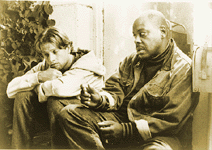
Director: Peter McCarthy
Screenplay: Peter McCarthy
Starring: James LeGros, Maritza Rivera, John Cusack, Steve Buscemi, Nelson Lyon, Billy Bob Thorton, Ethan Hawke, Lisa Zane, and Sy Richardson
 |
Year: 1994 - A-pix Entertainment
Director: Peter McCarthy Screenplay: Peter McCarthy Starring: James LeGros, Maritza Rivera, John Cusack, Steve Buscemi, Nelson Lyon, Billy Bob Thorton, Ethan Hawke, Lisa Zane, and Sy Richardson |
The riots had shaken John's faith in his fellow man and left him searching for some sort of spiritual center in his life. There is a great scene where John Cusack describes the spiritual dilemma and essence of religious experience to LeGros. John has been basically a humanist up until this point in his life, not really needing any type of formal spiritual philosophy other than to just treat people fairly and with respect. He soon begins to question whether his simple philosophy is enough. Compounding his religious and spiritual problem, throughout the film he comes in contact with very religious people who also seem to be morally bankrupt. It appears he is living in a world run by cynics who have no faith or respect for their fellow citizens. The many strange dreams and fantasies John experiences in the film make it appear he is on a sort of spiritual dream quest.
Just as his view of the world has been shaken, John's lifestyle begins to fall apart. He finds that the IRS has put a lien on his bank account, and his unemployment benefits have run out. John also finds out that his brother has walked out on his drug rehabilitation program. John will have to re-enroll his brother back into the program, which will require money he does not have. Ethan Hawke plays his brother Jimmy. Hawke's performance as the paranoid, strung out, sibling is so over the top, it's a wonder LeGros didn't bust out laughing during the scene. John contacts a school teacher he once admired, who is now a successful entrepreneur, for some money to help his money. He finds that his once idealistic icon has turned into a cynical, conservative, who embraces some fascist ideas. When he turns down John, it becomes apparent to John how money morally corrupts people. John's social life is not going too well either. The one girl he is really crazy about, only wants him for casual sex. Ironically, she is treating him in the same way he used to treat a formal girlfriend. This illustrates the consequences of John's reluctance to commit to anything, including personal relationships.
As John's luck keeps getting worse, he starts to question his philosophy
of trusting people. After an angry motorist pulls a gun on him, John succumbs
to his fears and buys a gun. Billy Bob Thorton does a great job of playing
the disrespectful gun dealer. Although John has a gun he doesn't realize
the full implications of using it. A hispanic youth pulls a gun on him
as a joke, and he is paralyzed with fear. He understands how the gun allows
its user to dominate other people. During one of his waking dreams one
night, he talks with some local crack heads about the coming revolt of
the underclass. After smoking crack with the addicts, John passes out on
the sidewalk. There he is ignored or robbed by passersby. He is eventually
helped by a man who rapes him. It is not clear if any of this sequence
is real or fantasy. Real or imagined, John has hit his lowest point. He
no longer trusts anyone and decides to turn to the aggressive behavior
he sees in others. At gunpoint, he kidnaps a woman he has watched from
a distance. Instead of being afraid and angry at John, she consoles him.
They eventually leave the city and go to a cheap hotel for sex. John believes
he has found a woman who believes in him and he starts to believe in himself.
The most hated public figure in John's mind is the L. A. Police Chief,
Merryl Fence. Fence, who is supposed to represent real-life Police Chief
Gates, is an arrogant racist who wants to impose a police state on the
city. John wants to do something that will alleviate the tension in the
city. He feels assassinating the police chief would do just that. He drives
to Fence's mansion and falls asleep while waiting for his victim. In a
dream he balks at killing the chief, fully understanding the implications
of killing another human being.
John decides that killing is not the answer for him. He returns to
his apartment to find that his old teacher has reconsidered and sent him
the money he needs for his brother and a little extra. John decides
to use the extra money to buy bread for the poor. It may seem like a small,
insignificant, self-serving act. But, it is an act that eases a little
suffering for some people for one day. John has learned he can only believe
and trust other people if he can believe and trust himself. The film
closes with the cast and crew singing Nick Lowe's "(What's So Funny 'bout)
Peace, Love, and Understanding?" This is an obvious reaction to the general
ugly cynicism that followed Rodney King's heartfelt plea, "Can't we all
just get along!"
On the whole this is a very uneven film. Sometimes funny, sometimes
scary, sometimes a little tedious. The film is at its most consistent when
it follows the script. Some of the improvisation by it's actors is great
(John Cusack), and other scenes fall flat (Ethan Hawke). Taken out
of its historical context, the movie loses most of its meaning. I won't
criticize the movie for its naive idealism. I think naive idealism is the
only hope we sometimes have.
![]()
Internet Movie Database: http://us.imdb.com